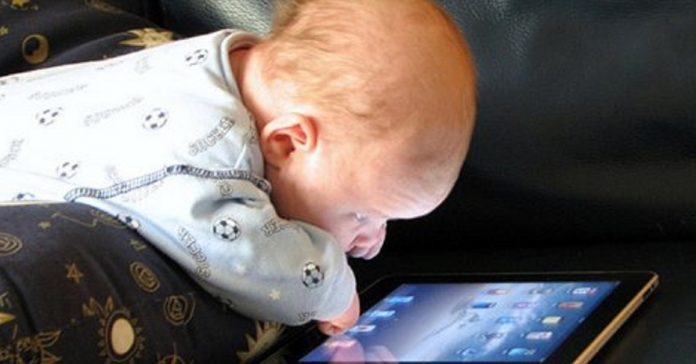Times have changed. In this day and age, it is not uncommon to see young children, even babies, swiping and tapping away at the screens of the numerous electronic devices that are now our constant companions.
It is still too early to tell exactly what is the full effect of the use of these devices for children, but the results from studies conducted by concerned researchers and educators are starting to come in.
And the answers aren’t looking pretty.

The latest study that has added fuel to the fire was released by a team led by Catherine Birken, a scientist and a pediatrician from The Hospital for Sick Child (SickKids).
Published in the American Speech-Language-Hearing Association (ASHA) Leader, the study observed 894 children that ranged from 6 months old to 2 years old over the course of 4 years, from 2011 to 2015.
A first of its kind, the goal of Birken’s study was to understand just how the use of electronic devices affected these young children before they developed speech.
It derived data from volunteering parents that recorded just how much screen time their child was allowed to have.
It didn’t take long before some patterns began to show.
Just a year and a half into the study, the researchers noted that there was a positive correlation between the increased handheld electronics usage and a delay in the child’s language-learning.
By the end of the study’s 4 years, the answer became clear – every 30 minutes that a child spends using an electronic device, the risk of delayed speech increases by a staggering 49 percent.
Although the researchers were cautious to note that the study did not take into account whether this sort of delay extends to other forms of communication, such as body language, this is still an alarming result.

Worries about this sort of negative impact on children is not a recent concern.
Sue Palmer, a literacy expert and a consultant on primary education, published a book titled “Toxic Childhood: How the Modern World Is Damaging Our Children and What We Can Do About It” in 2007.
This was nearly a full decade before Birkin’s study was released.
At the time, social communication giants such as Facebook were starting to achieve mainstream momentum.
This had prompted educators and parents alike to raise concern over the possible influence easily-accessible violent media could have on children.

Palmer, however, was looking at a less noticeable issue – the use of these electronic devices as digital pacifiers.
This, she noted, was a massive change in parenting – and one that is proving itself to not be for the better.
Instead of directly interacting with their babies and toddlers, exhausted parents have instead opted to hand over to their child an iPad or some equivalent.
In essence, the device was replacing the actual, physical parent.

There are, of course, positive results that stem from the use of digital devices in the education and care of children.
However, the fact remains that the technology must be used wisely for these potential pros to come about.
SEE ALSO:
Mom Is Baffled When School Lunch She Packed For Son Is Sent Back Home For Being ‘Unhealthy’
























